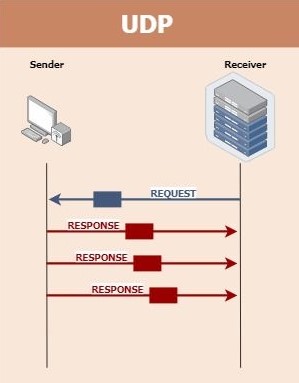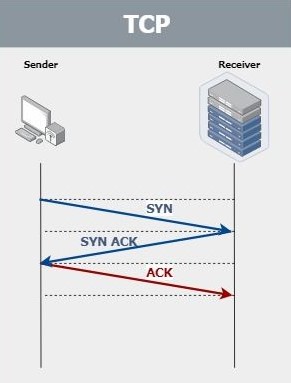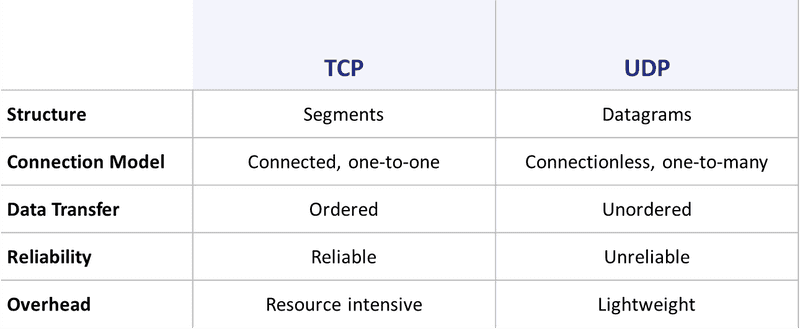UDP vs TCP: What are the differences? [2023]
Last updated on February 10th, 2023 in VPN
 Have you ever wondered what the differences between UDP and TCP are? Both UDP (User Datagram Protocol) and TCP (Transmission Control Protocol) are two of the major protocols used for communication over the internet. But what makes them different, and how do you decide in UDP vs TCP which one to use for your networked applications?
Have you ever wondered what the differences between UDP and TCP are? Both UDP (User Datagram Protocol) and TCP (Transmission Control Protocol) are two of the major protocols used for communication over the internet. But what makes them different, and how do you decide in UDP vs TCP which one to use for your networked applications?
In this blog post, we will take an in-depth look at both protocols and compare their features to help you make a more informed decision. We’ll explore their underlying architecture, pros and cons, and best practices for using either protocol in a variety of networking scenarios.
So if you are interested in learning more about UDP vs TCP, read on!
Table of contents

UDP is a simple protocol that allows for data to be sent over a network without the need for a reliable connection. This makes it ideal for applications where data needs to be sent quickly, but reliability is not a concern. UDP is often used for streaming video or audio because it can handle dropped packets without significantly affecting quality.
Another advantage of UDP is that it has very low overhead, so it can be used in real-time applications where every byte counts.
The following are some uses for UDP:
The advantages of UDP are as follows:
The disadvantages of UDP are as follows:

If you’re wondering about the difference between UDP and TCP, you’ve come to the right place. Both UDP and TCP are protocols used for communication across a network. They both have their own advantages and disadvantages, which we’ll go over in this article.
UDP is a connectionless protocol, which means that there is no set connection between two devices before communication can take place. This can be both an advantage and a disadvantage.
An advantage of UDP is that it’s faster than TCP because there is no need to establish a connection before sending data. A disadvantage of UDP is that it’s less reliable than TCP because there is no guarantee that the data will actually be delivered to the intended recipient.
TCP is a connection-oriented protocol, which means that a connection must be established between two devices before communication can take place. This adds overhead to the process, but it also makes TCP more reliable than UDP because the data is guaranteed to be delivered to the intended recipient.
The following are some uses for TCP:
The advantages of TCP are as follows:
The following are the drawbacks of utilizing TCP:

UDP and TCP are two different protocols that can be used for data communication. TCP is a connection-oriented protocol, which means that it requires a connection to be established between two devices before any data can be transferred. UDP is a connectionless protocol, which means that data can be sent without first establishing a connection.
TCP is a reliable protocol, which means that data will be delivered in the order in which it was sent. UDP is an unreliable protocol, which means that data may not be delivered in the order in which it was sent.
TCP is a slower protocol than UDP because it requires acknowledgement of each packet of data that is sent. UDP is a faster protocol than TCP because it does not require acknowledgement of each packet of data.
There are two types of Internet Protocol (IP) traffic. They are UDP (User Datagram Protocol) and TCP (Transmission Control Protocol). Both protocols send packets of data back and forth between devices on a network, but they do so in different ways. Here we will discuss the key differences between UDP and TCP.
UDP is connectionless, meaning that it does not set up a dedicated connection with another device before sending data. This makes it ideal for applications where speed is more important than reliability, such as streaming video or audio. It is also used by some gaming applications and by some DNS servers.
TCP, on the other hand, sets up a dedicated connection with another device before sending any data. This makes it slower than UDP but more reliable, as lost packets can be resent. TCP is therefore better suited to applications where reliability is more important than speed, such as email or web browsing.
Both TCP and UDP are compatible with OpenVPN, however, which one you pick will depend on your needs. Numerous top VPN companies, like HideIPVPN, use the open-source VPN technology known as OpenVPN. Although TCP is more dependable, UDP is chosen for a variety of applications and is typically the default protocol for most VPN services.
If you’re playing games, streaming content, or using VoIP, UDP is a fantastic choice. It might lose one or two packets, but it won’t significantly affect your connection as a whole. The experience can be entirely ruined if you utilize TCP for such services because it may create lag (especially if you’re connected to servers halfway around the world).
Consequently, OpenVPN over TCP is advised for static uses such as emailing, web browsing, and file transfer.
HideIPVPN offers a VPN service with military-grade encryption, and high-speed servers with unlimited bandwidth.
Our service comes with shared IP addresses so that your activity can never be tied to one particular user, further protecting your privacy.

We also offer DNS leak protection, a Kill Switch, the latest VPN protocols, and a guaranteed no-log policy.
Every purchase you make comes with a 30-day money-back guarantee.
In conclusion, UDP and TCP are two important protocols used in network communication.
They both have their own advantages and disadvantages depending on the application they are being used for. UDP is best suited for applications that need low latency, while TCP is more reliable but has a higher overhead cost.
Both of them offer different levels of reliability based on the type of data being sent across the network. Ultimately, it’s up to you to decide which protocol works best in your particular situation.